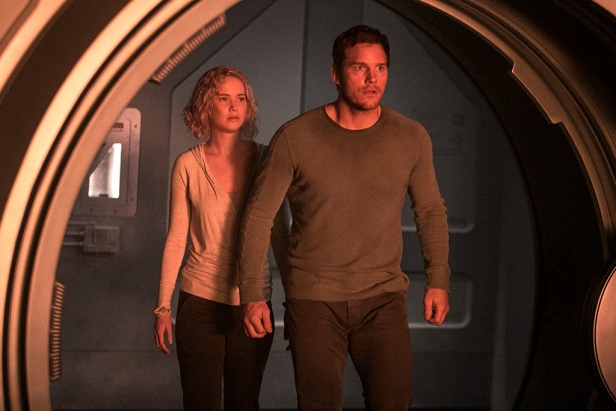Passengers takes the idea that humans were not designed to be solitary beings and begins in a similar manner to Duncan Jones’s Moon or more recently The Martian with Chris Pratt as engineer Jim Preston following in the footsteps of the brilliant Sam Rockwell and Matt Damon respectively as lone men lost in space.
Unfortunately, this romantic sci-fi adventure featuring two of the biggest stars working in Hollywood today ends in disaster thanks to a creepy plot point.
When Jim’s hibernation pod on the Starship Avalon malfunctions on his way to a new planet 30 years into what was supposed to be a 120-year stasis, he freaks out, but soon learns to keep himself occupied. Watching a playful Pratt wander around his grand surroundings (exquisitely designed by Guy Hendrix Dyas, nodding to the work of Stanley Kubrick and Douglas Trumball), playing basketball, getting drunk and conversing with a bartender android (Michael Sheen) is endearing and he sells this part of the film with his natural charisma.
However after one year alone he’s desperately depressed and in need of some company. When he comes across sleeping beauty and writer Aurora (Jennifer Lawrence), he feels a strong desire to satisfy his appetite by waking her.
To wake Aurora would be to strip her of her freedom of choice and sentence her to a lonely existence. Jim thinks long and hard about whether to make this selfish decision by cyber-stalking her, imagining he knows this woman through her written words and filmed interviews and essentially idealising her.
From this point on it’s very hard to buy into to a sweeping romance, and though the film does acknowledge what a terrible thing Jim has done, it fails to have the conviction to see that narrative through. Passengers instead opts for an icky conclusion that sees a woman fall for a man who has robbed her of a promising career and future.
Jon Spaihts’ screenplay touches upon interesting ideas that parallel modern world issues such as the notion that technology can sometimes exacerbate chronic loneliness but it loses its way with a fatal error of judgement.
